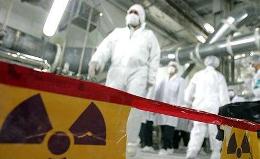 Iran supports the establishment of a Middle East free of nuclear weapons and backs efforts to dispose of existing ones in the region, Iranian Foreign Ministry spokesman Ramin Mehmanparast said today.
Iran supports the establishment of a Middle East free of nuclear weapons and backs efforts to dispose of existing ones in the region, Iranian Foreign Ministry spokesman Ramin Mehmanparast said today.
“We are at the forefront of efforts to scrap nuclear weapons,” Mehmanparast said at a press conference in Tehran aired live by Iran’s state television.
Iranian authorities complain of double standards over their country’s nuclear program, which they say is solely civilian while the U.S. and Israel say it may have military intent. Israel neither confirms nor denies its reputed nuclear-weapons arsenal. The London-based International Institute for Strategic Studies estimates that Israel has as many as 200 nuclear warheads.
“Countries which speak against our peaceful nuclear activities have themselves committed violations and acted against the nuclear Non-Proliferation Treaty,” Mehmanparast said. He said Iran, a signatory, abides by the treaty.
Israel, which has not signed the accord, has threatened military strikes to prevent Iran from acquiring nuclear weapons. The U.S. has backed diplomacy to achieve the same goal while warning that it too doesn’t rule out the use of force.
Mehmanparast criticized the cancellation of a proposed United Nations conference on ridding the region of weapons of mass destruction, and accused the U.S. of blocking the talks. The U.S. believes that “the conditions aren’t right for that conference to take place,” though it supports the goal, State Department spokesman Mark Toner said in December.
Saudi Call
Mehmanparast’s comments follow similar ones by the former intelligence chief of Saudi Arabia, a U.S. ally and one of Iran’s main regional rivals, who criticized nuclear powers for failing to convene the Middle East meeting.
“The only way we can reach a fair and workable solution to the issue is through a Middle East zone free of weapons of mass destruction,” Prince Turki al-Faisal said at the Munich Security Summit on Feb. 3. “Sanctions against Iran are not enough. The zone free of weapons of mass destruction is the only way that we can deal fairly with this issue.”
Signatories to the Nuclear Non-Proliferation Treaty pledged to work toward a Middle East free of nuclear weapons when they extended the accord in 1995. In 2010, they promised to hold a meeting in 2012 to begin the process of setting up the zone, a plan that was stymied by Israel’s reluctance to participate.
Such a plan “has never been put to the test, even in the most peaceful regions of the world,” Israeli atomic chief Shaul Chorev told the International Atomic Energy Agency in September. It’s “certainly much less applicable in the current volatile and hostile Middle East region.”
By Bloomberg
The Iran Project is not responsible for the content of quoted articles.

 QR code
QR code